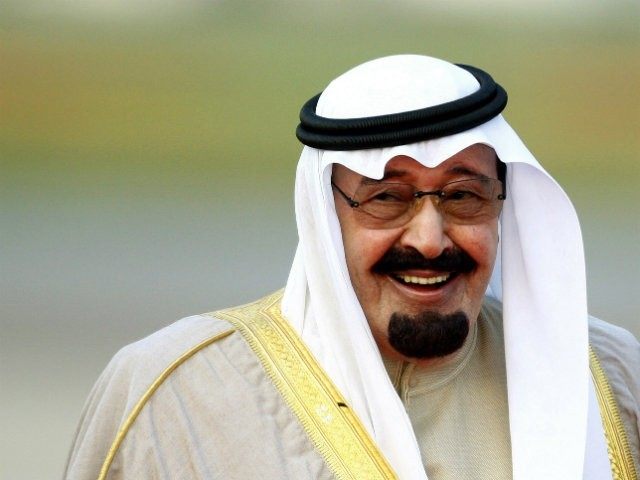King Abdullah of Saudi Arabia has died aged 90 after suffering with pneumonia for the last few weeks. The king ruled Saudi Arabia since 2005 and has been credited with bringing in moderate reforms to the conservative Muslim country.
He had been unwell for some time and was taken to the King Abdulaziz Medical City in the capital Riyadh on New Year’s Eve; following weeks of rumours the confirmation that he had died came just after 0100hrs local time, the Telegraph reports. The television stations immediately cut to readings from the Koran and images of the Qubba, the holy heart of Islam in the Great Mosque at Mecca.
The death of the world’s oldest monarch brings with it uncertainty for the future of the rich but potentially unstable country.
He has been immediately succeeded by his nominated heir, Crown Prince Salman, who like his brother immediately becomes “Custodian of the Two Holy Mosques” as monarchs in the oil rich kingdom are called.
The now King Salman, himself 79, immediately named Prince Muqruin as Crown Prince and his heir, confirming the decision of the royal Allegiance Council which made him deputy Crown Prince last year.
The death of King Abdullah, following his predecessor King Fahd brings closer the end of Saudi Arabia being ruled by the sons of King Abdulaziz Ibn Saud who founded modern Saudi Arabia in 1932. And it brings closer the rule of the next generation of rulers from the royal family, who run the kingdom like a family business.
Although only succeeding to the throne in 2005 he had been the de facto ruler since 1995 after his elder brother suffered a crippling stroke.
He gently pushed through reforms in a country which has no written down laws but instead is decided on the decision of judges and a deeply conservative establishment. These included greater freedom and education for women although campaigners say his reforms did not go nearly far enough.
He was trained from a young age to hold an important post in the country’s hierarchy and led and built the National Guard which earned him respect from many of the desert tribes in the country.
Surprising those who had assumed he was a political and religious conservative, he allowed more freedom for political debate, although this ended in the wake of the Arab Spring and deadly upheaval in the region.
His death comes at a difficult time for the Middle East as a whole with the ongoing civil war in Syria and the continuation of the war against the Islamic State.
The king’s support for the overthrow of Syrian President Bashar al-Assad was seen by Iran as a power grab. It also has much stronger ties with the US and the UK who recognised the importance of its opposition to Islamic State even though it was blamed in part for the rise of the extremist jihadis because of no real monitors in its citizens funding or joining up.
But as the biggest exporter of oil in the world as well as an important customer for Britain’s military industry, Saudi Arabia’s terrible record on human rights was often overlooked in a way that other countries which did not do business with the west were not.
Oil prices, which have been falling in recent weeks, have risen on the news of the late king’s death, with the market perhaps expecting a limit in supply to raise the price which many see was allowed to collapse as punishment to Iraq. But the decision was also putting pressure on the national budget, something the new monarch is not likely to want to start his reign without confronting.
US President Barack Obama expressed his “condolences and the sympathies of the American people” to the people of Saudi Arabia on hearing of the news, praising Abdullah, a key ally, for taking “bold steps” in advancing the Arab Peace Initiative, “an endeavour that will outlive him as an enduring contribution to the search for peace in the region.”
“As our countries worked together to confront many challenges, I always valued King Abdullah’s perspective and appreciated our genuine and warm friendship. As a leader, he was always candid and had the courage of his convictions. One of those convictions was his steadfast and passionate belief in the importance of the U.S.-Saudi relationship as a force for stability and security in the Middle East and beyond. The closeness and strength of the partnership between our two countries is part of King Abdullah’s legacy.”
The Foreign Secretary Philip Hammond said he was “very sad to hear of the death of the Custodian of the Two Holy Mosques, His Majesty King Abdullah bin Abd Al Aziz Al Saud.”
“He served the Kingdom of Saudi Arabia for many years with great dignity and dedication. His contribution to the prosperity and security of the Kingdom and the region will long be remembered. I would like to offer my sincere condolences to the Kingdom of Saudi Arabia and its people at this sad time.”
It is likely that Prince Charles will represent the British Royal Family at the funeral, being close to several members of the Saudi Royal Family and having visited the country on numerous occasions.
But it will still be a sensitive occasion especially whilst a major campaign is under way to stop the 1,000 lashes ordered to be inflicted on Raif Badawi, a prominent writer and blogger, for challenging the country’s religious authorities.

COMMENTS
Please let us know if you're having issues with commenting.